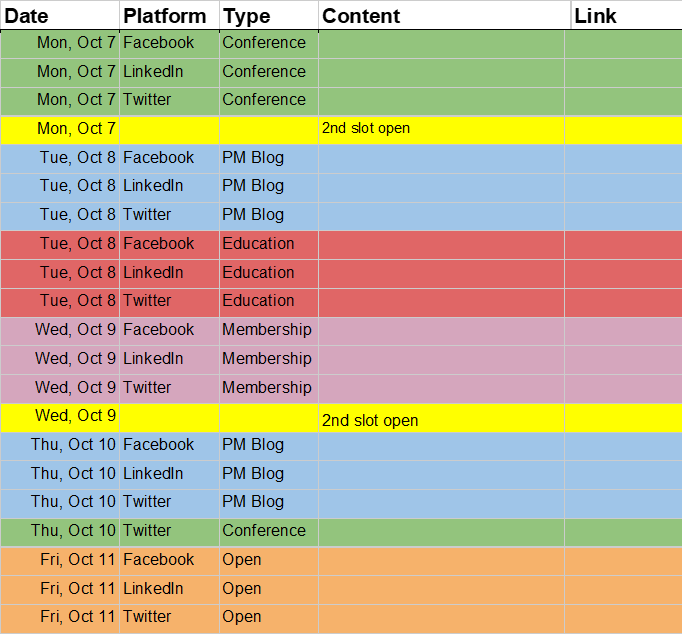“I need to start using social media in my practice.”
Is that what you’re telling yourself? It’s a great place to start, but there’s a lot more to social media success than just “being there.” The first question I ask planners to consider is, “Why am I using (or planning to use) social media as part of my marketing strategy?”
If it’s because you want to let the world know your political stance or complain about something, it’s probably not the best use of your time (on or off the clock). But if it’s to build a community, get the word out about your business and show you are an expert in financial planning—then social media can be an extremely valuable tool! It’s all in how you make your plan, execute it and stick with it.
I’ve included a few of my favorite tips below to help you get started.
Social Media Has Its Place…
…But that doesn’t mean it should run your schedule. It’s so easy to get sucked into your Facebook timeline, or deep into the string of replies to a tweet. Responding in a timely manner is important—and now platforms like Facebook track your response rate—but don’t beat yourself up trying to answer every message or comment 15 seconds after it comes through.
An easy solution is to turn on notifications for direct messages, which is where most people go when they are seeking help from you or your business. For comments that come through, set aside a daily time block to monitor your page(s). I recommend 10 minutes; unless you are a social media superstar, that is likely enough time to ensure that you are seeing all of the comments that have been published on each of your posts.
It’s also equally important to have an established process in place to handle complaints, mentions and comments on your social media platforms. Whether it’s the CEO or a part-time intern who is monitoring the account, you want everybody to be on the same page and know when to respond, and how to respond when it’s appropriate.
Create a Lasting Connection
Social media offers a great way to help people understand who you, and your business, really are. If your customers are really buying “you,” what do you want and need them to know ? Use your social media platforms to connect with your audience and have a discussion. Keep asking them questions and producing different types of content—if you pay attention, you’ll start to notice patterns and understand the topics that truly matter to your followers.
Did you post something that got absolutely no engagement? Take a deep breath and remember it’s not the end of the world. Social media is a process of trial and error: test, gather data and adjust your strategy.
Consistency is Critical
Raise your hand if you think consistency is important. If you don’t see your hand reflected in the computer monitor, we need to take this offline. (And if you’re the guy who raised his hand on the subway, don’t worry—you’re definitely not the weirdest one on that train.)
When it comes to social media, consistency is key. It doesn’t matter whether you post every day or once per week—being consistent builds trust with your audience. An easy way to keep track of your content is through a calendar. It doesn’t matter if you use an Excel spreadsheet or a sophisticated project management tool; find what works for you and use it. You can stop at Level 1, or go 100 Levels deep – it all depends on your skill level, interest and the time you can put toward social media. Here’s what Levels 1, 10 and 100 might look like:
Level 1: I want to post on each platform once a week. How do I make it look like I’m active on social media?
Determine the platforms you want to be active on and spread out your content. Use the ideas in Level 10 below for content generation, and set up a simple calendar like this:

Level 10: I want to post on each platform once per day. But how in the world will I create enough content for that?!
It’s a lot easier than you think! All your content doesn’t have to be original blogs that are thousands of words each. Here’s one example:

Build fun stuff about you and your company into your social media plan. People want to know about you; they can easily learn about your products and services through your website and by contacting you.
Level 100: Alright, I’ve got all this down. I want to post on multiple social media platforms multiple times a day.
Awesome! Remember how I said you could use an Excel spreadsheet for your content calendar? If you didn’t believe me, now you should! I love Google Docs, and use it for scheduling content across the Financial Planning Association’s social media platforms.
Here’s my outline:

It’s color-coded by type of content. Each type of content goes out the same day each week (consistency is key). I sprinkle in Instagram posts throughout the calendar, based on what content I think will work well there (it’s not a huge platform for us, so I don’t put as much attention there).
A content writer I work with swears by Airtable—I’ve used it with her, and it is a neat platform. Ultimately, it boils down to what works best for you and what will keep you organized and on track.
I’ll close with a few of my key things to remember about social media:
- A consistent, regular presence is key.
- Make sure your profile info is completed and detailed; people often go to social media instead of Google to learn more about you or how to get in touch with you. Just because something is not my favorite platform doesn’t mean I would take my company off it.
- Don’t put all your eggs in one basket. Case in point: Instagram not updating anybody’s feeds after the iOS update earlier this year. It took at least a week before I saw any new content in my feed…which means I didn’t see any new content from the businesses I follow.
- Create a content calendar—it makes your life easier!
- Your social media posts, retweets, likes, favorites (all of it) is reflective of YOU, your beliefs and your business. Be intentional with what you like and what you post.
As a final note, social media is a free* platform to tell your story. Why the asterisk? Because nothing is truly free. Organic content costs you your time, and paid advertising costs you time and money.
The takeaway? Be intentional with every piece of content you create and post.
Now, get out there and hashtag make it a great day!

Mari Shirley has worked in communications and marketing for a decade, mostly in the financial industry. She started her career in public relations at the University of Georgia Athletic Association (Go Dawgs!), and before joining the Financial Planning Association, she was a brand marketer for Dave Ramsey’s Endorsed Local Providers and SmartVestor programs. At FPA, she focuses on social media strategy and brand and digital marketing.
Leave a Reply